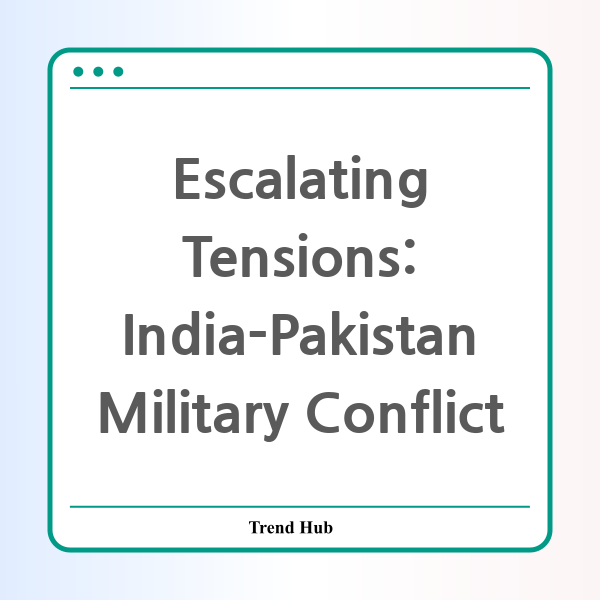* This website participates in the Amazon Affiliate Program and earns from qualifying purchases.

The ongoing conflict between India and Pakistan has reached a critical juncture, as both nations accuse each other of escalating military actions. With fresh military operations being launched, the situation in the region is increasingly precarious. But what are the latest developments that could alter the dynamics between these two nuclear-armed neighbors?
Recently, Pakistan announced a military operation dubbed "Operation Bunyan Marsus" in response to alleged strikes from India targeting its military bases. This escalation comes after weeks of tension heightened by the tragic massacre of tourists in Indian-administered Kashmir, an area that has long been a flashpoint for conflict between the two countries. The retaliatory nature of these actions is indicative of a longstanding cycle of violence, wherein both sides feel compelled to respond aggressively to perceived threats.
The military confrontation has not only led to casualties on both sides, including the confirmed death of an Indian government official, but it has also raised alarm bells internationally. The U.S. has stepped in, with Washington offering to mediate the situation in an effort to stave off further violence. Secretary of State Marco Rubio has been in talks with both Indian and Pakistani diplomats, urging a return to dialogue.
As the conflict unfolds, the international community has expressed concern. Leaders from the G7 nations and the European Union have called for maximum restraint from both parties, emphasizing the need for immediate de-escalation to prevent any further loss of life and potential catastrophe. These calls for peace are necessary, as both countries have a history of military engagements that have resulted in significant casualties and geopolitical repercussions.
One of the most contentious issues fueling this conflict remains the disputed territory of Kashmir. This region has been a source of contention since both nations gained independence from British rule in 1947. Both India and Pakistan claim Kashmir in full, having fought three wars over the territory, with each side controlling parts of it. Given this backdrop, the latest military actions are seen by many analysts as part of a broader strategy to assert territorial claims and military superiority.
The statements from military officials on both sides suggest a deeply entrenched narrative of aggression and victimhood. India's military claims it has "effectively countered" Pakistan's operations, accusing Islamabad of targeting civilian infrastructure as well as military sites, including hospitals and schools. On the other hand, Pakistan's officials assert that their actions are defensive in nature, aimed at safeguarding their sovereignty.
As drone attacks and missile strikes continue to escalate, the potential for miscalculation grows. Analysts have indicated that the current situation may carry catastrophic risks not only for the two countries but for regional stability as a whole. The presence of nuclear weapons in both countries complicates the situation even further, underscoring the need for immediate and effective conflict resolution mechanisms.
In conclusion, the military confrontation between India and Pakistan represents a deeply-rooted conflict with complex historical and geopolitical factors at play. The international community's calls for restraint highlight the urgency to find a peaceful resolution to prevent further loss of life and restore stability in the region. All eyes will be on the developments in this high-stakes situation, as the world hopes for a constructive dialogue that leads to lasting peace.
* This website participates in the Amazon Affiliate Program and earns from qualifying purchases.